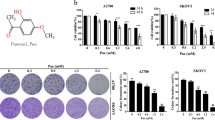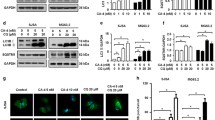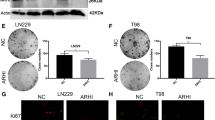Abstract
Aim
The present study aims to examine the effects of apatinib combined with autophagy inhibitor 3-Methyladenine (3-MA) on the proliferation and apoptosis of human uterine sarcoma in FU-MMT-1 and MES-SA cells and its tumor inhibition effect in xenograft model of uterine sarcoma.
Methods
Different concentrations of 3-MA and apatinib were used to treat the uterine sarcoma cell lines (MES-SA and FU-MMT-1 cells). The cell viability was detected by CCK8 method. Flow cytometry was used to detect the apoptosis and cell cycle. Wound closure assay and Transwell assay were performed to measure the migration ability of cells. Western blot was used to determine the apoptosis proteins and autophagy proteins. A nude mice sarcoma xenograft model was established and treated with apatinib alone, 3-MA alone, or combined incubation of them. Tumor size of xenograft and the mice survival rate were measured.
Results
Combination of 3-MA and apatinib significantly inhibited the proliferation and migration ability, but increased the apoptosis rate of uterine sarcoma cells compared to apatinib. The combination of 3-MA and apatinib significantly limited the tumor size of xenograft and increased the survival rate of mice compared to apatinib alone. Apatinib inhibited the PI3K/Akt/mTOR pathway, while 3-MA and the combination of 3-MA and apatinib significantly activated the PI3K/Akt/mTOR pathway and inhibited autophagy. Combination of 3-MA and apatinib increased apoptosis compared to apatinib alone. The expression of VEGFR-2 was not impacted by 3-MA.
Conclusion
Combination of apatinib and autophagy inhibitor 3-MA significantly inhibited the growth and migration of uterine sarcoma cells and xenograft. Autophagy inhibition may increase the antitumor effect of apatinib via the PI3K/Akt/mTOR pathway.






Similar content being viewed by others
Data availability statement
The datasets generated during and/or analysed during the current study are available from the corresponding author on reasonable request.
Abbreviations
- 3-MA:
-
3-Methyladenine
- CCK8:
-
Cholecystokinin 8
- PI3K:
-
Phosphatidylinositol 3-kinase
- mTOR:
-
Mammalian Target of Rapamycin
- VEGF:
-
Endothelial growth factor
- VEGFR-2:
-
Endothelial growth factor receptor 2
- FBS:
-
Fetal bovine serum
- DMEM:
-
Dulbecco's Modified Eagle Medium
- SD:
-
Standard deviation
- SDS:
-
Sodium dodecyl sulfate
- GAPDH:
-
Glyceraldehyde-3-phosphate dehydrogenase
- APA:
-
Apatinib
- ANOVA:
-
One-way analyses of variance
- ABCB1:
-
P-glycoprotein 1
- ABCG2:
-
ATP-binding cassette transporter G2
References
Mbatani N, Olawaiye AB, Prat J (2018) Uterine sarcomas. Int J Gynaecol Obstet 2:51–58
Kyriazoglou A, Liontos M, Ziogas DC, Zagouri F, Koutsoukos K, Tsironis G, Tsiara A, Kaparelou M, Zakopoulou R, Thomakos N, Haidopoulos D, Papaspyrou I, Rodolakis A, Bamias A, Dimopoulos MA (2018) Management of uterine sarcomas and prognostic indicators: real world data from a single-institution. BMC Cancer 18:018–5156
Amant F, Coosemans A, Debiec-Rychter M, Timmerman D, Vergote I (2009) Clinical management of uterine sarcomas. Lancet Oncol 10:1188–1198
Ghirardi V, Bizzarri N, Guida F, Vascone C, Costantini B, Scambia G, Fagotti A (2019) Role of surgery in gynaecological sarcomas. Oncotarget 10:2561–2575
Koh WJ, Abu-Rustum NR, Bean S, Bradley K, Campos SM, Cho KR, Chon HS, Chu C, Cohn D, Crispens MA, Damast S, Dorigo O, Eifel PJ, Fisher CM, Frederick P, Gaffney DK, George S, Han E, Higgins S, Huh WK, Lurain JR 3rd, Mariani A, Mutch D, Nagel C, Nekhlyudov L, Fader AN, Remmenga SW, Reynolds RK, Tillmanns T, Ueda S, Wyse E, Yashar CM, McMillian NR, Scavone JL (2018) Uterine Neoplasms, Version 12018, NCCN Clinical Practice Guidelines in Oncology. J Natl Compr Canc Netw 16:170–199
Schwartz SM, Weiss NS, Daling JR, Gammon MD, Liff JM, Watt J, Lynch CF, Newcomb PA, Armstrong BK, Thompson WD (1996) Exogenous sex hormone use, correlates of endogenous hormone levels, and the incidence of histologic types of sarcoma of the uterus. Cancer 77:717–724
Felix AS, Cook LS, Gaudet MM, Rohan TE, Schouten LJ, Setiawan VW, Wise LA, Anderson KE, Bernstein L, De Vivo I, Friedenreich CM, Gapstur SM, Goldbohm RA, Henderson B, Horn-Ross PL, Kolonel L, Lacey JV, Liang X, Lissowska J, Magliocco A, McCullough ML, Miller AB, Olson SH, Palmer JR, Park Y, Patel AV, Prescott J, Rastogi R, Robien K, Rosenberg L, Schairer C, Ou Shu X, van den Brandt PA, Virkus RA, Wentzensen N, Xiang YB, Xu WH, Yang HP, Brinton LA (2013) The etiology of uterine sarcomas: a pooled analysis of the epidemiology of endometrial cancer consortium. Br J Cancer 108:727–734
Muskiet FA, Stratingh MC, Stob GJ, Wolthers BG (1981) Simultaneous determination of the four major catecholamine metabolites and estimation of a serotonin metabolite in urine by capillary gas chromatography of their tert-butyldimethylsilyl derivatives. Clin Chem 27:223–227
Zhang H (2015) Apatinib for molecular targeted therapy in tumor. Drug Des Devel Ther 9:6075–6081
Hu X, Cao J, Hu W, Wu C, Pan Y, Cai L, Tong Z, Wang S, Li J, Wang Z, Wang B, Chen X, Yu H (2014) Multicenter phase II study of apatinib in non-triple-negative metastatic breast cancer. BMC Cancer 14:1471–2407
Hu X, Zhang J, Xu B, Jiang Z, Ragaz J, Tong Z, Zhang Q, Wang X, Feng J, Pang D, Fan M, Li J, Wang B, Wang Z, Zhang Q, Sun S, Liao C (2014) Multicenter phase II study of apatinib, a novel VEGFR inhibitor in heavily pretreated patients with metastatic triple-negative breast cancer. Int J Cancer 135:1961–1969
Zhen L, Jiali C, Yong F, Han X, Hongming P, Weidong H (2018) The efficacy and safety of apatinib treatment for patients with unresectable or relapsed liver cancer: a retrospective study. J Cancer 9:2773–2777
Tewari D, Patni P, Bishayee A, Sah AN (2019) Natural products targeting the PI3K-Akt-mTOR signaling pathway in cancer: A novel therapeutic strategy. Semin Cancer Biol 19:30405–30405
Sui H, Luo M, Miao Y, Cheng W, Wen S, Zhao B, Li Y, Qiao Z, Liu Y, Xu C (2020) Cystic fibrosis transmembrane conductance regulator ameliorates lipopolysaccharide-induced acute lung injury by inhibiting autophagy through PI3K/AKT/mTOR pathway in mice. Respir Physiol Neurobiol 273:11
Yao Y, Zhou D, Shi D, Zhang H, Zhan S, Shao X, Sun K, Sun L, Wu G, Tian K, Zhu X, He S (2019) GLI1 overexpression promotes gastric cancer cell proliferation and migration and induces drug resistance by combining with the AKT-mTOR pathway. Biomed Pharmacother 111:993–1004
Wu S, Wang X, Chen J, Chen Y (2013) Autophagy of cancer stem cells is involved with chemoresistance of colon cancer cells. Biochem Biophys Res Commun 434:898–903
Yao L, Chen S, Li W (2020) Fatostatin inhibits the development of endometrial carcinoma in endometrial carcinoma cells and a xenograft model by targeting lipid metabolism. Arch Biochem Biophys 684:108327
Feng SQ, Wang GJ, Zhang JW, Xie Y, Sun RB, Fei F, Huang JQ, Wang Y, Aa JY, Zhou F (2018) Combined treatment with apatinib and docetaxel in A549 xenograft mice and its cellular pharmacokinetic basis. Acta Pharmacol Sin 39:1670–1680
Cao H, Jia Q, Shen D, Yan L, Chen C, Xing S (2019) Quercetin has a protective effect on atherosclerosis via enhancement of autophagy in ApoE(-/-) mice. Exp Ther Med 18:2451–2458
Xu J, Liu X, Yang S, Zhang X, Shi Y (2018) Clinical response to apatinib monotherapy in advanced non-small cell lung cancer. Asia Pac J Clin Oncol 14:264–269
Kou P, Zhang Y, Shao W, Zhu H, Zhang J, Wang H, Kong L, Yu J (2017) Significant efficacy and well safety of apatinib in an advanced liver cancer patient: a case report and literature review. Oncotarget 8:20510–20515
Lin Y, Wu Z, Zhang J, Hu X, Wang Z, Wang B, Cao J, Wang L (2017) Apatinib for metastatic breast cancer in non-clinical trial setting: Satisfying efficacy regardless of previous anti-angiogenic treatment. Tumour Biol 39:1010428317711033
Ding L, Li QJ, You KY, Jiang ZM, Yao HR (2016) The Use of Apatinib in treating nonsmall-cell lung cancer: case report and review of literature. Medicine 95:0000000000003598
Roviello G, Ravelli A, Polom K, Petrioli R, Marano L, Marrelli D, Roviello F, Generali D (2016) Apatinib: a novel receptor tyrosine kinase inhibitor for the treatment of gastric cancer. Cancer Lett 372:187–191
Wu J, Yu J, Wang J, Zhang C, Shang K, Yao X, Cao B (2018) Astragalus polysaccharide enhanced antitumor effects of Apatinib in gastric cancer AGS cells by inhibiting AKT signalling pathway. Biomed Pharmacother 100:176–183
Mi YJ, Liang YJ, Huang HB, Zhao HY, Wu CP, Wang F, Tao LY, Zhang CZ, Dai CL, Tiwari AK, Ma XX, To KK, Ambudkar SV, Chen ZS, Fu LW (2010) Apatinib (YN968D1) reverses multidrug resistance by inhibiting the efflux function of multiple ATP-binding cassette transporters. Cancer Res 70:7981–7991
Xue JM, Astère M, Zhong MX, Lin H, Shen J, Zhu YX (2018) Efficacy and safety of apatinib treatment for gastric cancer, hepatocellular carcinoma and non-small cell lung cancer: a meta-analysis. Onco Targets Ther 11:6119–6128
Li F, Zhu T, Cao B, Wang J, Liang L (2017) Apatinib enhances antitumour activity of EGFR-TKIs in non-small cell lung cancer with EGFR-TKI resistance. Eur J Cancer 84:184–192
Wen S, Shao G, Zheng J, Zeng H, Luo J, Gu D (2019) Apatinib regulates the cell proliferation and apoptosis of liver cancer by regulation of VEGFR2/STAT3 signaling. Pathol Res Pract 215(4):816–821
Maroufi NF, Vahedian V, Akbarzadeh M, Mohammadian M, Zahedi M, Isazadeh A, Pouremamali F, Taefehshokr S, Heidari M, Rashidi M, Nouri M (2020) The apatinib inhibits breast cancer cell line MDA-MB-231 in vitro by inducing apoptosis, cell cycle arrest, and regulating nuclear factor-κB (NF-κB) and mitogen-activated protein kinase (MAPK) signaling pathways. Breast Cancer 27(4):613–620
Meng X, Wang H, Zhao J, Hu L, Zhi J, Wei S, Ruan X, Hou X, Li D, Zhang J, Yang W, Qian B, Wu Y, Zhang Y, Meng Z, Guan L, Zhang H, Zheng X, Gao M (2020) Apatinib inhibits cell proliferation and induces autophagy in human papillary thyroid carcinoma via the PI3K/Akt/mTOR signaling pathway. Front Oncol 10:217
Song YA, Ma T, Zhang XY, Cheng XS, Olajuyin AM, Sun ZF, Zhang XJ (2019) Apatinib preferentially inhibits PC9 gefitinib-resistant cancer cells by inducing cell cycle arrest and inhibiting VEGFR signaling pathway. Cancer Cell Int 19:117
Roviello G, Ravelli A, Fiaschi AI, Cappelletti MR, Gobbi A, Senti C, Zanotti L, Polom K, Reynolds AR, Fox SB, Generali D (2016) Apatinib for the treatment of gastric cancer. Expert Rev Gastroenterol Hepatol 10:887–892
Liu C, Xing W, Si T, Yu H, Guo Z (2017) Efficacy and safety of apatinib combined with transarterial chemoembolization for hepatocellular carcinoma with portal venous tumor thrombus: a retrospective study. Oncotarget 8:100734–100745
Schulte N, Ebert MP, Härtel N (2014) Gastric cancer: new drugs—new strategies. Gastrointest Tumors 1:180–194
Chen LT, Oh DY, Ryu MH, Yeh KH, Yeo W, Carlesi R, Cheng R, Kim J, Orlando M, Kang YK (2017) Anti-angiogenic therapy in patients with advanced gastric and gastroesophageal junction cancer: a systematic review. Cancer Res Treat 49:851–868
Peng QX, Han YW, Zhang YL, Hu J, Fan J, Fu SZ, Xu S, Wan Q (2017) Apatinib inhibits VEGFR-2 and angiogenesis in an in vivo murine model of nasopharyngeal carcinoma. Oncotarget 8:52813–52822
Yang J, Pi C, Wang G (2018) Inhibition of PI3K/Akt/mTOR pathway by apigenin induces apoptosis and autophagy in hepatocellular carcinoma cells. Biomed Pharmacother 103:699–707
Katayama M, Kawaguchi T, Berger MS, Pieper RO (2007) DNA damaging agent-induced autophagy produces a cytoprotective adenosine triphosphate surge in malignant glioma cells. Cell Death Differ 14:548–558
Dong Y, Wu Y, Zhao GL, Ye ZY, Xing CG, Yang XD (2019) Inhibition of autophagy by 3-MA promotes hypoxia-induced apoptosis in human colorectal cancer cells. Eur Rev Med Pharmacol Sci 23:1047–1054
Yu W, Wang Y, Zhu J, Jin L, Liu B, Xia K, Wang J, Gao J, Liang C, Tao H (2019) Autophagy inhibitor enhance ZnPc/BSA nanoparticle induced photodynamic therapy by suppressing PD-L1 expression in osteosarcoma immunotherapy. Biomaterials 192:128–139
Cheong H, Lu C, Lindsten T, Thompson CB (2012) Therapeutic targets in cancer cell metabolism and autophagy. Nat Biotechnol 30:671–678
Chen YS, Song HX, Lu Y, Li X, Chen T, Zhang Y, Xue JX, Liu H, Kan B, Yang G, Fu T (2011) Autophagy inhibition contributes to radiation sensitization of esophageal squamous carcinoma cells. Dis Esophagus 24:437–443
Li J, Hou N, Faried A, Tsutsumi S, Takeuchi T, Kuwano H (2009) Inhibition of autophagy by 3-MA enhances the effect of 5-FU-induced apoptosis in colon cancer cells. Ann Surg Oncol 16:761–771
Liu F, Liu D, Yang Y, Zhao S (2013) Effect of autophagy inhibition on chemotherapy-induced apoptosis in A549 lung cancer cells. Oncol Lett 5:1261–1265
Liu Z, Liu J, Li L, Nie D, Tao Q, Wu J, Fan J, Lin C, Zhao S, Ju D (2015) Inhibition of Autophagy Potentiated the Antitumor Effect of Nedaplatin in Cisplatin-Resistant Nasopharyngeal Carcinoma Cells. PLoS ONE 10:0135236
Cheng X, Feng H, Wu H, Jin Z, Shen X, Kuang J, Huo Z, Chen X, Gao H, Ye F, Ji X, Jing X, Zhang Y, Zhang T, Qiu W, Zhao R (2018) Targeting autophagy enhances apatinib-induced apoptosis via endoplasmic reticulum stress for human colorectal cancer. Cancer Lett 431:105–114
Kimmelman AC (2011) The dynamic nature of autophagy in cancer. Genes Dev 25:1999–2010
Edinger AL, Thompson CB (2004) Death by design: apoptosis, necrosis and autophagy. Curr Opin Cell Biol 16:663–669
Bauvy C, Gane P, Arico S, Codogno P, Ogier-Denis E (2001) Autophagy delays sulindac sulfide-induced apoptosis in the human intestinal colon cancer cell line HT-29. Exp Cell Res 268:139–149
Fu X, Pan Y, Wang J, Liu Q, Yang G, Li J (2008) The role of autophagy in human lung cancer cell line A549 induced by Vinorelbine. Zhongguo Fei Ai Za Zhi 11:345–348
Yang Q, Guan KL (2007) Expanding mTOR signaling. Cell Res 17:666–681
Funding
The work was supported by Hebei Provincial Department of Science and Technology (No. 182777246).
Author information
Authors and Affiliations
Contributions
Shucheng Chen performed the study and wrote the paper; Lan Yao designed the study, revised the paper and provided the funding.
Corresponding author
Ethics declarations
Conflict of interests
No potential conflict of interest relevant to this article was reported.
Ethical approval
The study was approved by Ethics Committee of Fourth Hospital of Hebei Medical University (No. FHHMU-2018265).
Additional information
Publisher's Note
Springer Nature remains neutral with regard to jurisdictional claims in published maps and institutional affiliations.
Rights and permissions
About this article
Cite this article
Chen, S., Yao, L. Autophagy inhibitor potentiates the antitumor efficacy of apatinib in uterine sarcoma by stimulating PI3K/Akt/mTOR pathway. Cancer Chemother Pharmacol 88, 323–334 (2021). https://doi.org/10.1007/s00280-021-04291-5
Received:
Accepted:
Published:
Issue Date:
DOI: https://doi.org/10.1007/s00280-021-04291-5




